The Fate of Tonga’s Criminal Returnees
Credit to Author: James Borrowdale| Date: Fri, 08 Feb 2019 12:57:21 +0000
The crime that returned John* to Tonga began in a harshly lit gas station, somewhere on Las Vegas’ Sahara Avenue. He told the story while reclining on the grass fringing Nuku’alofa’s waterfront, just down the road from the Royal Palace. A thickly humid breeze ruffled the palm trees above, and a couple of discolored mutts, teats swollen following recent litters, patrolled the grass scavenging for the fried chicken that sat between us. Boys paddled in the shallows offshore.
John, 31, was shirtless in the heat, black hair gathered into a loose ponytail, a bandage wrapped around his left forefinger. A couple of his teeth were missing, and a big scar dissected his forehead. The word ‘CRIPS’ was tattooed in a crescent over his stomach, the letters ‘T’ and ‘C’ on each of his forearms. He had been just eight months old when his family moved from Tonga, New Zealand to Salt Lake City, a stronghold of the Tongan Crip Gang, the TCG. His entire family was in the gang, and he says his own initiation was automatic. “We knew we were Crips from I can’t remember how far back.”
He tossed a bone in the direction of the dogs, then licked his fingers. He had been staying with his sister in Las Vegas. “The youngster I was running with, I already gave him a pistol right, so we had one apiece. We went to his house and his grandfather ended up seeing him with a gun so his grandfather smacked him around a bit, you know, smacked him around and cussed him out—why is he running around with a gun, he can barely wipe his own ass.”
This kid—a year or two younger than then-15-year-old John—was embarrassed, and had a point to prove. John sourced him another pistol, and they stopped for gas. “I went to the back to grab us a beer. When I turned around and looked to the front, he already had the gun to the cashier’s head. I guess he had it in his mind to rob the place… I went straight to the candy aisle and started pouring all the candy into my shirt, and I started to walk out.” But he didn’t like the way their victim had been “laughing at the little homie. So I put the gun to his head and told him to hurry up and put everything in a bag. He gave us the small bills.” The kids were too unworldly to know the big notes were kept at the bottom of the drawer.
Then, a block up the road, they had a realization. “I was like, ‘Ah shit, you know what, we going to jail, we forgot to snatch the video tape… we gonna go to jail, we might as well make it worth it.’ We stopped at every single gas station up Sahara Avenue and robbed all of them. Once we got to the suburbs, we started robbing houses.”
They fled the city, as surveillance footage of their crimes played on the news, arriving in another TCG redoubt in Los Angeles. They found violence there, too. “We ended up chompin’ a couple of Blood niggas on the railroad tracks… then we got into a shootout. After that I told him, ‘Let’s go back to Vegas. We better off getting caught up for robbery than murder, right?’”
They returned to his friend’s family home in Las Vegas. John was, by now, dating his accomplice’s sister. Her mother, he says, didn’t approve, and she called the cops. “I woke up that morning and went down to grab a smoke and the police were already waiting outside. They surrounded the whole house, snatched us up.”
“I didn’t even know I wasn’t American until they deported me. Until immigration came to get me.”
He was charged as an adult and did 12 years in prison. When his sentence was served, he was taken straight from the lockup to an Immigration and Customs Enforcement facility. “I didn’t even know I wasn’t American until they deported me. Until immigration came to get me.” By every metric—except for the one that in this particular case matters—he is American, and arriving in Tonga, accompanied by a couple of US Marshalls, was like going back in time: showering from a pipe, flushing the toilet with a bucket of water. John will never be allowed back into the States. Four years since he arrived, he still hasn’t adjusted to life in Tonga; he calls his situation “the forever no.”
He learned to speak Tongan by drinking with locals, but his relationship with his family—traversing a cultural divide and complicated by the stigma of his former life—is strained. “I know they talk about me behind my back.” He says most Tongans judge deportees for having fucked up their opportunities for good and prosperous lives in the developed nations they were deported from, and resent them for it. The rest, he says, just figure all deportees are rapists and murderers and steer well clear.
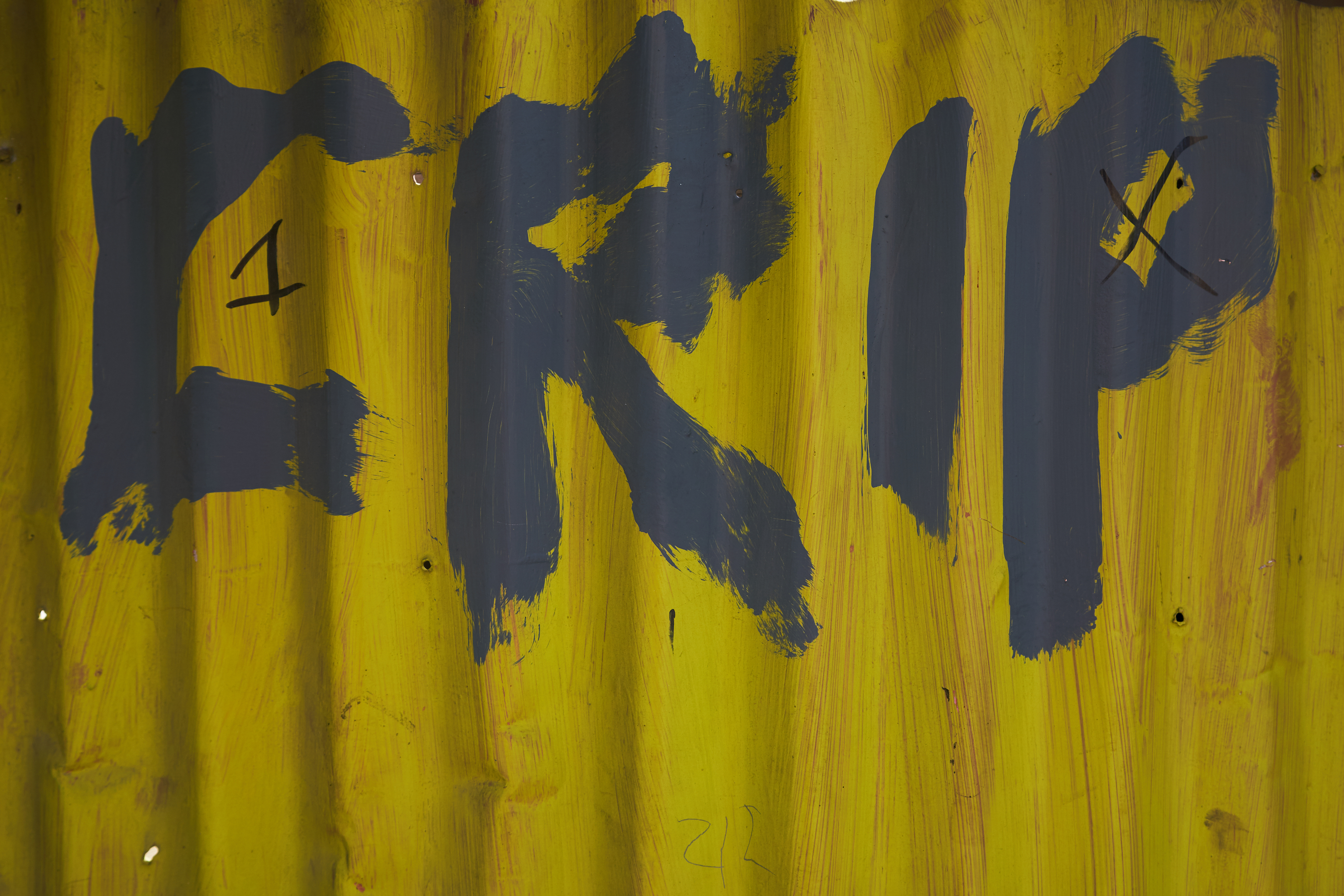
When we spoke, Kalisi Tohifolau was Tonga’s Acting Deputy Police Commissioner. Her office, near Nuku’alofa’s dusty central market, was covered in towering stacks of paper, which occasionally threatened to topple over as she dug through them to find statistics as we talked.
She prefers the term “returnees” to describe those Tongans who were never granted citizenship in the countries they migrated to, and were subsequently deported after serving prison sentences. A 2011 UNESCO report titled Return[ed] to Paradise interviewed 56 such returnees to Tonga and Samoa—80 percent of respondents flagged a lack of connection to the local culture as a primary concern. Reintegration into a country, Tohifolau says, is difficult for people, like John, whose connection to their families in Tonga has been severed.
In 2017, she said, there were 77 “criminal returnees” (as opposed to overstayers) from all countries, and in 2016 there had been 104. Most deportees arrive from the US, Australia, and New Zealand. Between 2010 and November 2018, New Zealand deported 57 Tongan citizens after completion of their sentences. In 2017 it was reported that 400 deportees had been returned to Tonga in the preceding five years. A government official told VICE that the total number of deportees living in Tonga could be as high as 1000. In a poor country of just under 110,000 people, these are significant numbers, especially when considered against the resources available and the violence of the crimes some deportees committed abroad. “We are seeing more serious prisoners coming back—child sex offenders, drug traffickers, robbers,” Tohifolau says.
Recidivism, she says, is rife, and “a big worry for Tonga.” The severity of the individual returnee’s criminal history, Tohifolau says, is the major factor that will determine how a deportee will fare on their return to the Pacific nation. She told the story of a man deported from New Zealand for manslaughter. Within six months, he’d committed the same crime in Tonga. “It doesn’t matter where they came from, it just depends on their previous convictions.”
Violent criminals with little or no connection to the country are unlikely to suddenly go straight when cut adrift in a strange place. “What we find, a lot of them, there’s not really much connection with the local family, and [sometimes] they’re not welcome in that family so they just go back into looking for other criminals and keep communicating with syndicates back where they came from.” Many will return to the kind of life—the crime, the drugs—that got them deported in the first place.
Methamphetamine has flooded the small country. The Kingdom’s Women and Children Crisis Centre has made an urgent plea for Tonga’s leaders to address the problem after a spate of meth-related suicides and domestic abuse, and 1 NEWS reports that in the midst of a “meth epidemic” dealers are targeting children. Over the 2018/19 holiday period, Tongan Police made 20 drug arrests, seizing guns, cash, meth, and ammo. In the first half of 2018, Tohifolau told me, police had already exceeded the entire number of meth arrests of the year before.
For Tohifolau, the two issues—criminal deportees and the rise of drugs like meth—are intertwined. With the US once again increasing the number of deportations—in 2018, more than 256,000 people were deported from the States, the highest number since the end of the Obama administration—it means more worry for Tohifolau and Tonga. “I think most of the serious drug offenders are deportees from America… Some of these offenders are locals, but the most serious ones are mostly deportees.”
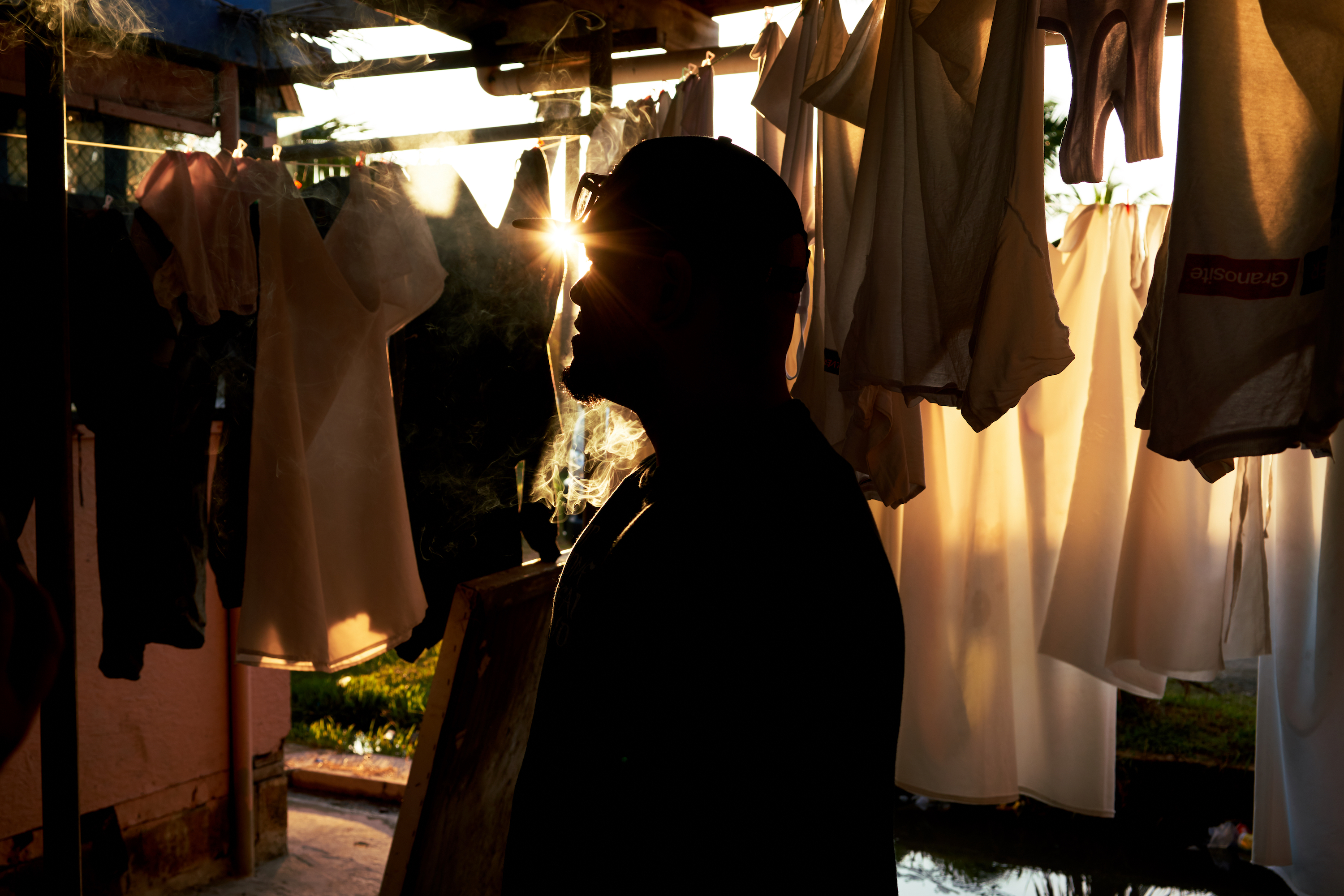
Talia’uli Prescott—’Uli for short—introduced himself as a “motherfucking gangster.” He counted off the time: he’d been back in Tonga for one month and nine days. We met him at an old friend’s house, down a Nuku’alofa back street. Dusk gathered as we talked, bats were rising from the trees and children wheeling past on bicycles.
He’s a big man with a soft voice, ‘K’ and ‘C’—for ‘King Cobras’—tattooed in capital letters on each of his forearms and a turret of facial hair jutting from his chin. After being sent from Tonga to St. Paul’s College in Auckland as a 13-year-old, he tried to go straight, but he said that there was a “little man inside me with the drum, beating loud” and he gravitated toward the gang. “It’s a very good family. When you don’t have your own, they give you one. When you have your own, they support that one.”
He was deported back to Tonga after serving a sentence for a crime that involved “guns and violence.” It was a gang fight. “It came down to one fella eh. I came out on top. He was in a coma in the hospital for quite some time. When I think about it now, it’s a very stupid thing to do.”
He arrived in the country with his “criminal record and a piece of paper with my name on it”. His brother picked him up from the airport, and he’s since sourced a job at the wharf. He still framed his future in the gang paradigm that had been the defining element of his adult life. “The only thing I can do here is change, but in a healthy environment. What I know, you can’t just deal drugs to be a gangster; you can do other things to be a gangster.”
Night had fallen, fireflies lit the light streaming from inside. A children’s choir, preparing to practice for their church service the next morning had assembled cross-legged on the woven mat under portraits of Queen Elizabeth II. “My whole world used to be like this,” ‘Uli said, motioning wide, “and now it’s just me, and that’s the only gang I need.”
I met him a couple of days later, and he’d thought about how he’d presented his life. In the dust and noise of Queen Salote Wharf, where he works, ‘Uli was wearing a fluorescent orange vest. He said he regretted his initial introduction to us as a gangster; it was an unthinking impulse, and what he really wants is for his return to Tonga to spur a life that doesn’t orbit, even mentally, around gang life. “I got to change my life to become better, be part of society. I want to have a wife and kids, and a steady job. It would be nice to have a little family to work with, instead of working with a criminal organization.”
He’d had his job at the port for just three weeks, content to take pleasure in the simple things: honest work, a crime-free existence, accruing the markers of a lawful life, like a driver’s license, which he’d never had before. The bluster of the previous conversation was gone. “Life is beautiful, if you learn how to live it.”
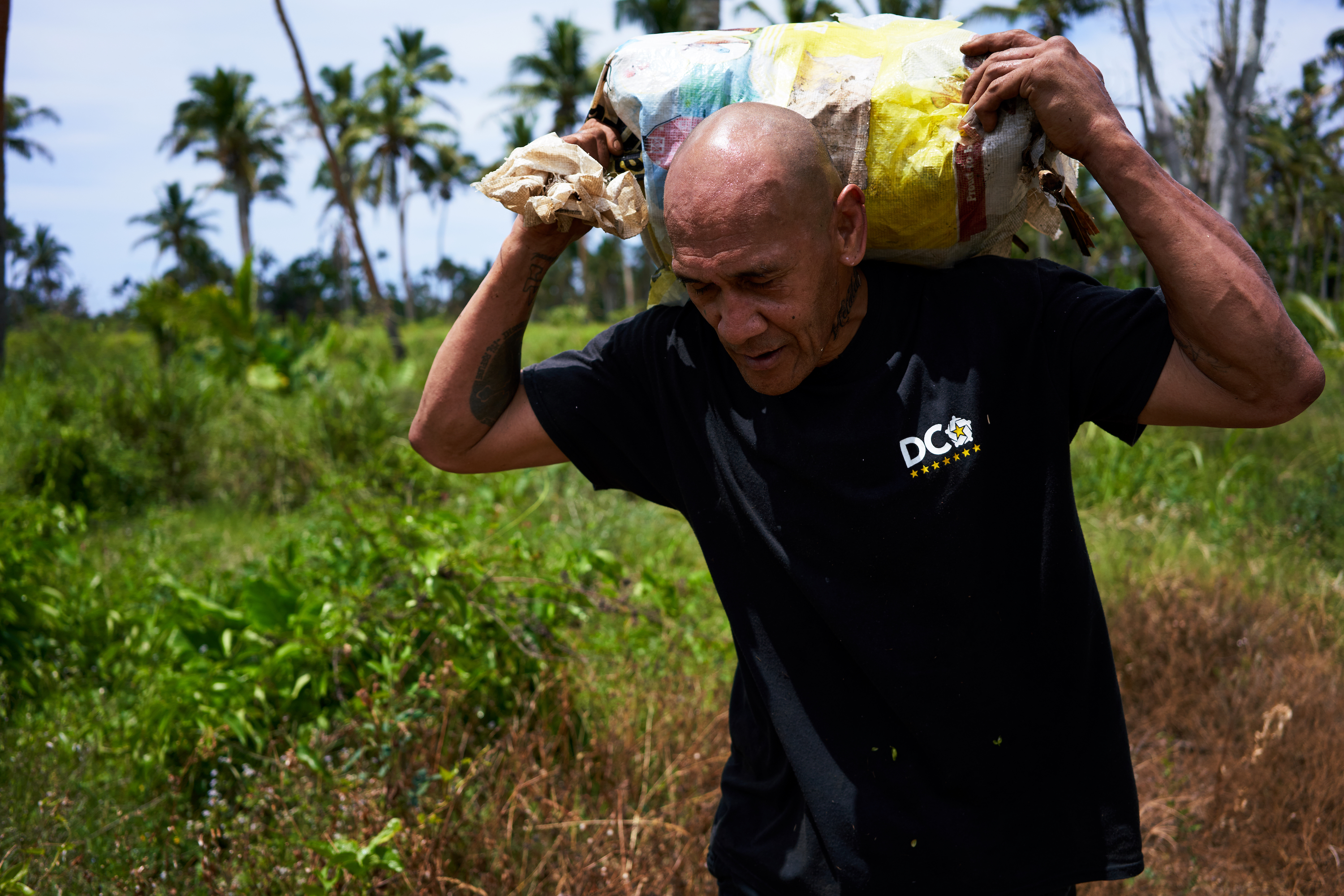
They once called him “No Good,” and a tattoo on his thigh commemorates the nickname.
Sione Ngaue was on the land his family left to him, a six-hectare [14 acre] parcel in the flat, hot Tongan hinterland. He had a knife in one hand and a burlap sack slung over his shoulder. As he marched through the neck-high grasses, he bent low to hack away the undergrowth, filling the sack with manioke, a local root vegetable. Sweat beaded on his shaved head. “When I first got here, I come in the bush and I’d scratch like heck, itching and stuff. All these centipedes would bite me, now it’s like I’m immune to it.”
Sione was four when his family moved from Tonga to Los Angeles. His first bike was given to him by the local gang—the Raymond Avenue Crips—and the first crime he remembers committing, as a nine-year-old, was stealing a Ford Pinto. When the Police caught him just down the street, he hadn’t managed to shift it out of first gear. He joined the gang and did “all the bad things,” and grew up in the juvenile system. “I have a record probably this big,” he said, his hands a foot apart. His body is a tapestry of a life lived on the wrong side of the law—pockmarked with bullet holes, defaced by scars, colored in by prison tattoos.
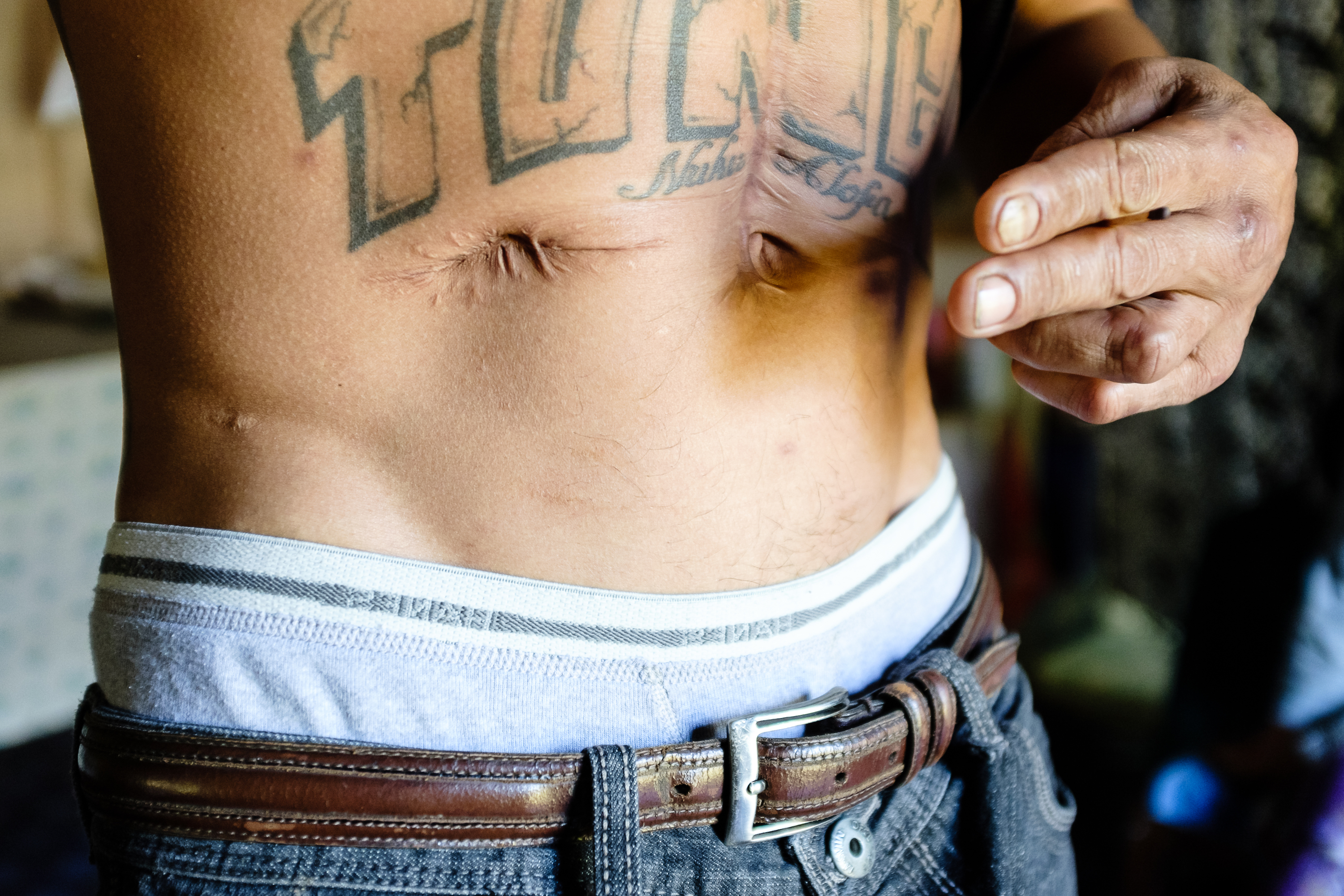
He was deported at age 44, after serving 15 years for manslaughter. He met his now wife, Ma’ata, who taught him Tongan as he helped her improve her English. He credits her not just with teaching him how to speak, but also how to be, Tongan—how to grow into the ‘TONGA’ tattoo he had inked onto his own stomach in his American prison cell, how to roast a whole pig, how to cultivate his land, how to be humble.
He’s lucky, also, for having somewhere to live: The little home his grandfather built in the traditional style, its corrugated-iron roof like a turtle’s shell, in the village of Nukunuku. He prepared an umu, a Tongan earth oven, full of the manioke he had harvested earlier, his enormous pet pig scrounging for attention, his two boys clambering up a tree for the coconuts in the foliage, Ma’ata inside preparing fish. The woodsmoke cast a haze over his lawn, and occasionally you’d catch a bar or two of the Sunday afternoon hymns floating on the breeze. “Now when I talk to my friends on Facebook, I just ask them to call me Good, stop calling me No Good. They do it, they say, ‘What’s up Good? What’s going on in Tonga?’”
“Nobody wants to hire us because they think we’re going to steal or do something bad.”
Most deportees, he says, aren’t so fortunate. Without a free place to stay, they need to rent—and for that they need to work, which is almost impossible for some. Eighty-seven percent of respondents to Return[ed] to Paradise found finding a job or another source of income one of the biggest hardships in their new lives. “We’re judged before they even get to know us,” Sione says. “We have a red ‘X’ against us so we can’t get employment. Nobody wants to hire us because they think we’re going to steal or do something bad.”
Ngaue says he made a promise to himself when he was turfed off the plane and into Tonga by the accompanying US Marshalls—walking the 20 kilometers [12 miles] from the airport into town, he swore he’d never again see the inside of a prison cell. And, to this day, he hasn’t. One of his brothers still in the States is serving a life sentence, and his older brother, also a deportee, has been inside Tonga’s Hu’atolitoli Prison “five or six” times.
Sione, who learned to tattoo on the inside, supports his family with the little tattoo parlor he runs in the heart of downtown Nuku’alofa. He says he now wants to help other deportees adjust to life here as well as he eventually managed to. There’s nothing in the way of government support for deported Tongans, just the scattered goodwill of a couple of churches, and Sione wants to turn his family land into a place that could help his fellow deportees. Somewhere they could learn to grow vegetables, build themselves a little dwelling, and settle in—like Sione—to life in Tonga. “What we want to do here with the new deportees is give them a second chance at life.”
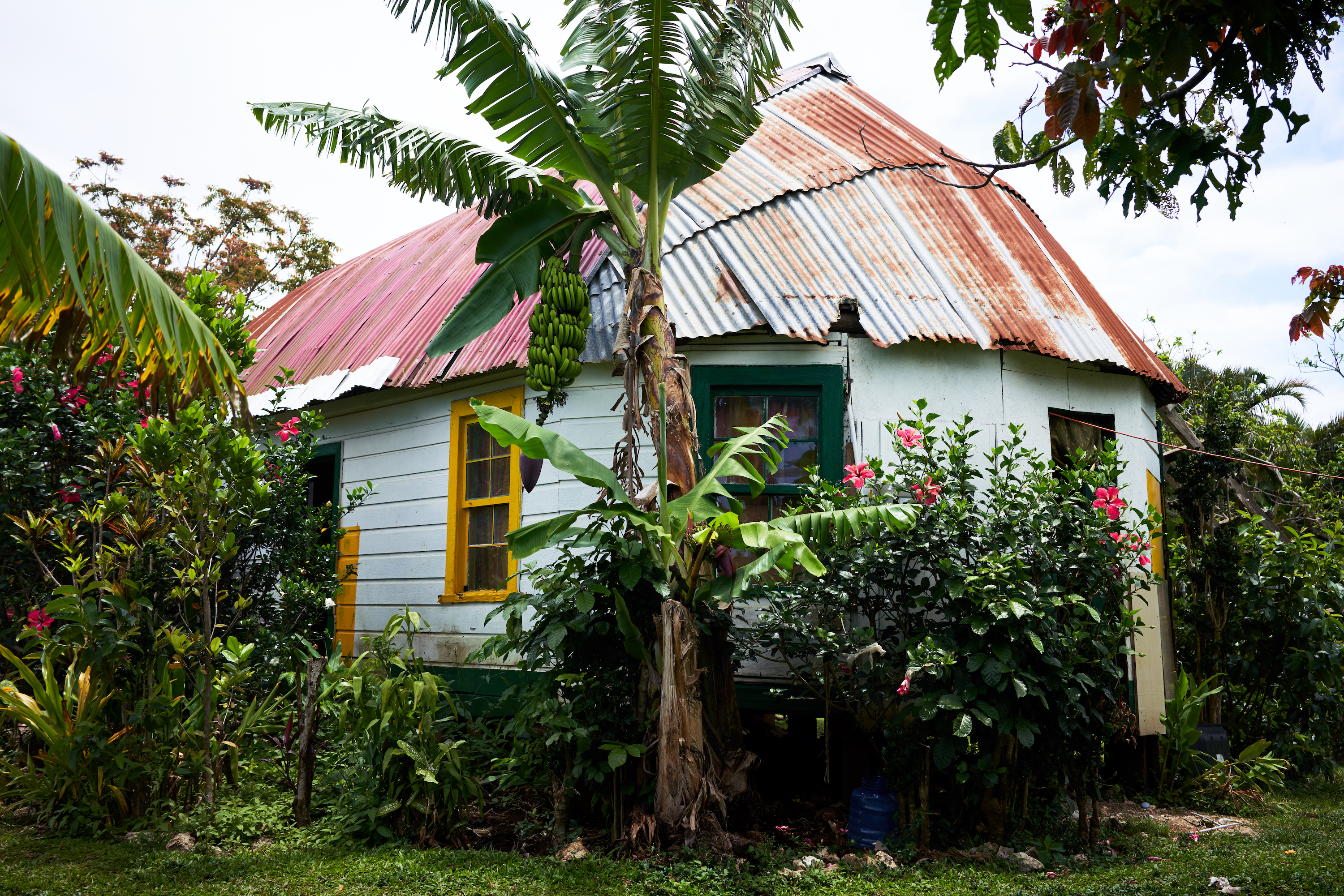
In March 2017, Tonga held its National Deportation Reintegration Conference. During his opening remarks, Deputy Prime Minister Siaosi Sovaleni drew attention to Tonga’s “community social net,” the family, church, and social ties that usually ensure those most vulnerable—in a poor country unable to provide much welfare—at least have their basic needs met. Deportees, he acknowledged, fall outside this informal system. “[They] have not, for the most part, grown up within these communities, and although family ties may exist, they do not guarantee access to this form of social support, health, unemployment, and a lack of income may therefore be difficult issues for deportees who face limited or no access to social networks.”
According to a confidential memorandum, obtained by VICE, recommendations that came out of the three-day event included the construction of a Reconnection Home “where deportees will meet any family members, service providers, and starting of reintegration program into the Society.” Sione remembers the promise “to raise money for the deportees to build some kind of institution that could help… they got funded, a lot of money.”
Reverend Fili Lilo of the Free Wesleyan Church of Tonga is the Secretary of the National Forum of Church Leaders at the Ministry of Internal Affairs, and was at that 2017 conference. We spoke under the eaves of a church hall on the waterfront outskirts of Nuku’alofa, waves tickling the shore under swaying palms. In 2005, his church established its Deportation Reconnection program, which endeavors to connect returnees with their families—to effectively loop them back into that community social net Sovaleni had spoken of at the conference’s opening.
As for the commitment to build a government facility to help deportees reintegrate into Tongan society—made at least 18 months before Lilo spoke with VICE—he said the funding was still “in process.” “We have to set up something, a policy on the offering of funding and that kind of things, but it is a process.” Acting Deputy Tohifolau had told me that finding funding in the country was a challenge, given the Kingdom’s limited resources.
Sione says he has seen these promises before, and isn’t convinced. He says there is nothing for deportees. Those who require medication aren’t getting it, and those without family land to fall back on—or without a family willing to take them in—go homeless. “Every time they accumulate money, the deportees see nothing… They bring them down here to Tonga and just let them go.” The result, he says, is that deportees “end up doing the things they did in the States to survive here in Tonga.”
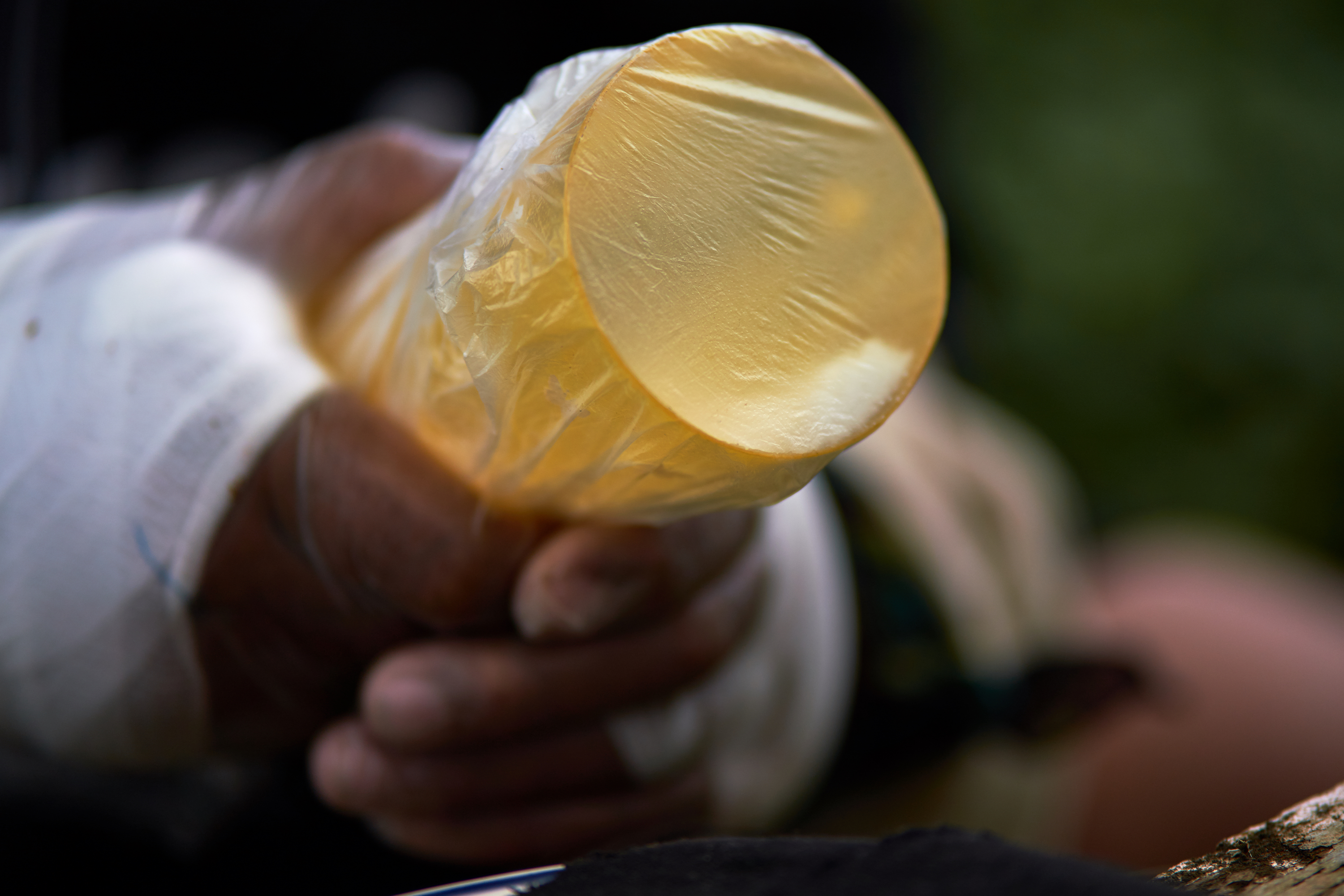
“Meth is blowing up out here, it’s fucking big time.”
Half an ounce of meth sat in a yellow plastic cup on the table between us as Aisi*, a deportee, explained how the trade works in Tonga. He says he was there at one of the first big-time deals to bring large quantities of the drug into the country. “He guaranteed within three months he’d fucking flood Tonga, and that he did.”
He poked at the white crystals with a twig. He believes his is the “best shit”—imported from Mexico, he says—you can get in the country. “If you were to smoke this right here, you’d be walking up and down… Life story in 30 seconds. That’s the truth. You ever met anybody who smokes? First hit they’ll tell you their life story in 30 seconds.” In his village he estimates that, in a family of five, there are on average three meth users. In Tonga, they call it “puff.”
He doesn’t smoke himself. His motto, he said, was “up with hope, down with dope.” “But, you know, if you’re going to smoke, come to right person with the right price and you’ll get the best deal of your life.”
“If you’re in love with drugs, I’m your best friend. Because I love money.”
He feels no guilt about selling meth, even if he sees the harm it’s doing around him: girls as young as 13 selling their bodies for a hit, the breakdown of traditional family structures, the guns now common on the streets. “It’s a fair exchange for me; you get what you want, I get what I want. You know, if you’re in love with drugs, I’m your best friend because I love money.”
And he makes a lot of it. He says if he were to go straight and get a job, he’d pull in $150 or so a week; as it stands he makes $500 a day, and much more on Sundays, during which he says he’ll sell to some 200 people. “About five to midnight, easy five grand. That’s a fucking easy five grand.”
Tonga—despite what is printed on his documents—isn’t home. You get the sense he has little commitment to Tonga as a country, as an idea: it’s just the place some shadowy global bureaucracy determined he would live. “I’m not going anywhere, I’m not seeing any improvements, [so] I fall back on what I used to do… Fucking killing everybody else to better myself.” He laughed ruefully. “That sounds terrible.”
He took me for a drive around the village, pointing out the houses that ran meth operations, or that used to. One house: “He actually had his own little thing going, then he tried to move from his table and sit on the high table,” he said through an ominous chuckle. We paused before lurching down the rutted mud road where his supplier lived. He was nervous about being seen cruising past with the conspicuous face of a stranger peering out from his passenger seat.
“There’s a lot of deportees out here,” he said, when I asked why this village in particular seemed so badly afflicted by meth. It won’t be long, he says, until Tonga is truly ruined by the drug he sells. “Everything is going to blow up.”
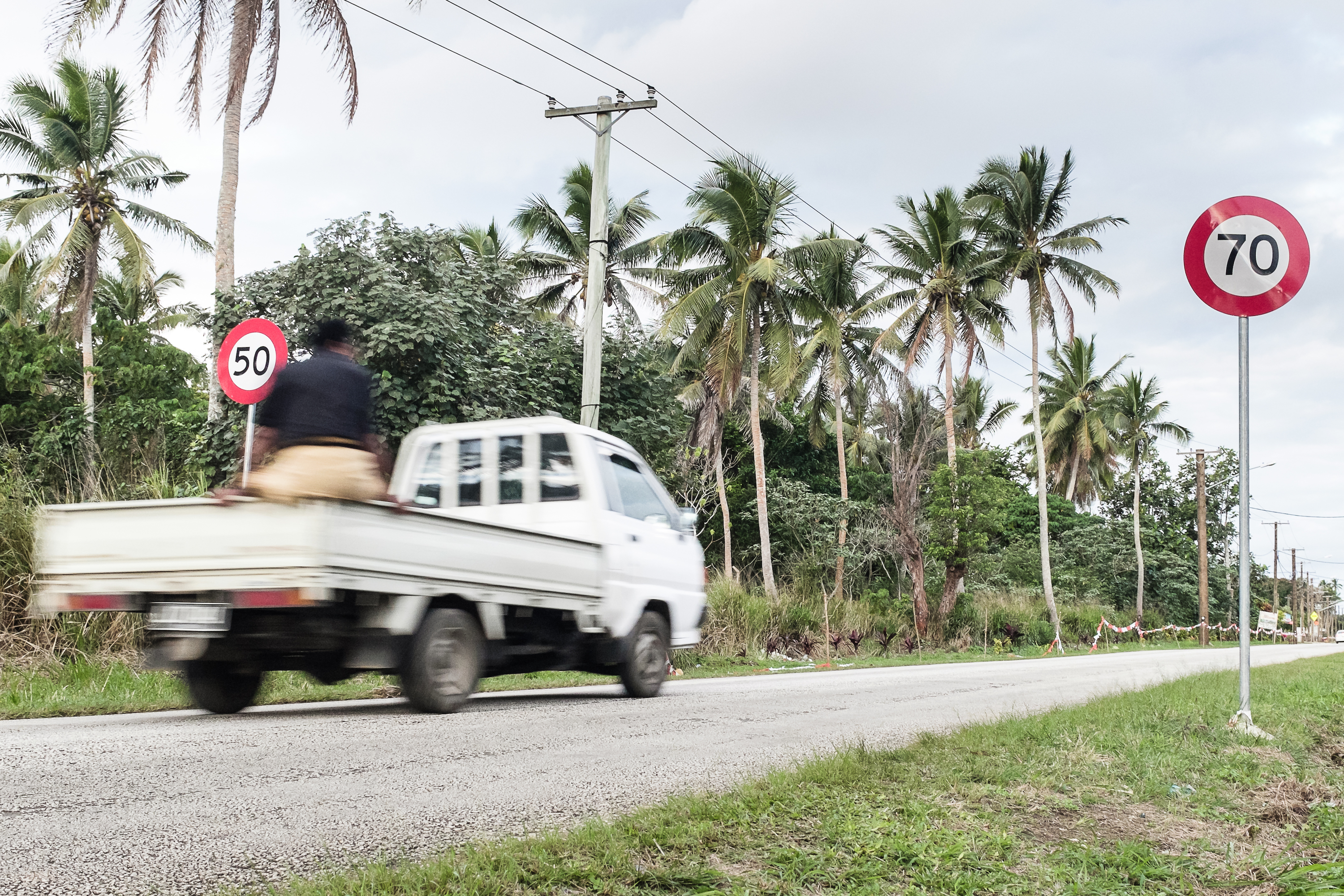
Manslaughter, armed robbery, assault. The crimes that eventually returned the Tongan deportees I met were violent, with victims left dead or suffering lifelong consequences. But these returnees had all served hefty sentences before their deportations to Tonga; they had already repaid their debt to society—at least to the societies, across the ocean, many still consider home. For some, deportation feels like a lifelong continuation of that sentence. Like crabs in a bucket was how one New Zealand deportee described how it felt to be trapped in Tonga, away from his wife and family back home.
For others, like Sione Ngaue, Tonga has been a kind of salvation. ‘Uli Prescott, still adjusting, hopes for his new life to follow a similar trajectory. His family still owns the plot of land that he remembers from childhood, and he plans to one day build himself a little house there. “This is home,” he said one evening, strolling through the empty section in the faded evening light. “It feels strange. I was gone nearly 20 years. And then come back and it still feels the same, as when I was a little kid.” He says he no longer feels like a gang member when he comes here; this piece of land connects him with a version of himself that knew nothing of the gangs and violence that came to him later in life.
And John has skirted around the edges of illegal enterprise since he’s been back in Tonga, but now has vague plans to open some kind of legitimate business: a tattoo parlor, a hair salon, a restaurant—whatever, he says, as long as he can work for himself. He doesn’t know whether he’ll be able to build a good life in the country of his birth—but he does know that America, home, will always tug uselessly at his heart. “I tell myself all the time that I like it here… I think mainly I just tell myself that because I know I can’t go back.”
*Names have been changed.
Follow James on Twitter here. Follow Todd on Instagram here.
Sign up for our newsletter to get the best of VICE delivered to your inbox daily.
This article originally appeared on VICE New Zealand.
This article originally appeared on VICE NZ.